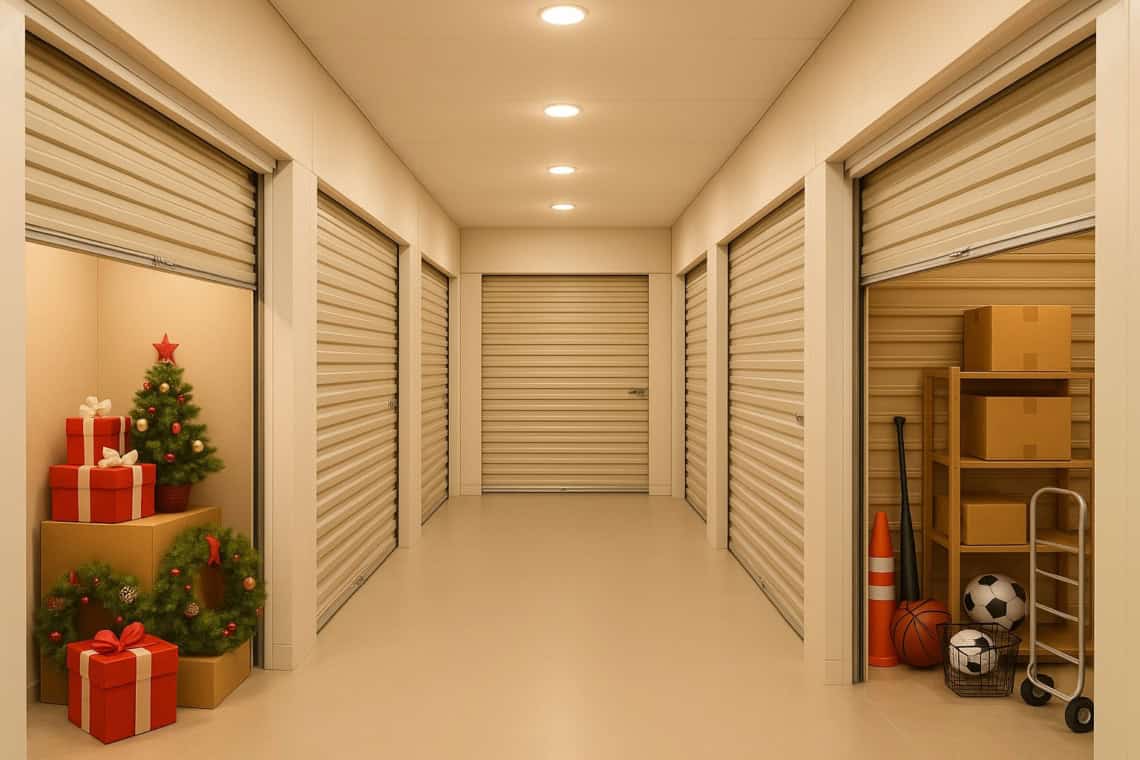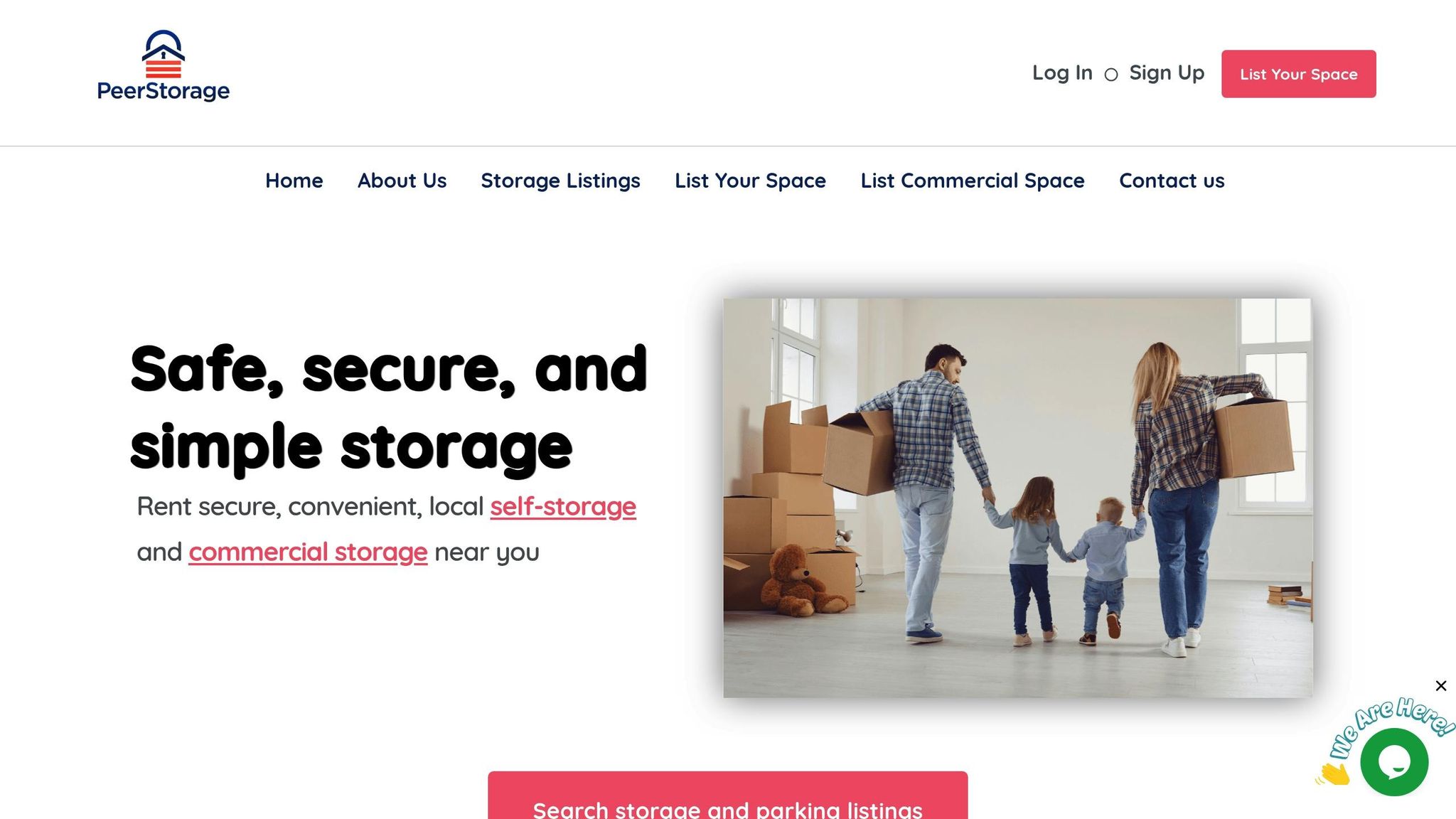Ultimate Guide to Marketing Metrics for Storage Hosts
- October 6, 2025
- Self Storage
Tracking marketing metrics is the key to understanding your storage hosting performance. These numbers reveal how well your efforts attract renters,…
Read More
Seasonal businesses often face fluctuating storage needs, especially during peak periods like holidays or busy seasons. Choosing between self-storage and commercial storage depends on factors like cost, space requirements, and operational flexibility. Here’s a quick breakdown:
Key Differences:
Quick Comparison:
| Criteria | Self-Storage | Commercial Storage |
|---|---|---|
| Cost | $50–$300/month | $8–$15/sq ft annually |
| Contract Terms | Month-to-month | Long-term leases (1+ years) |
| Space Size | 25–400 sq ft | 1,000+ sq ft |
| Access Hours | Standard or 24/7 | Often 24/7 with loading docks |
| Uses | Storage only | Storage, logistics, packaging |
For a tailored solution, platforms like PeerStorage combine both options, offering flexible terms and a wide range of storage types. Choose the solution that aligns with your business size, budget, and storage needs.
Seasonal businesses often face fluctuating storage demands throughout the year. Self-storage offers a practical solution with flexible, short-term rental options tailored to meet these shifting needs. Let’s explore the key features, advantages, and challenges that come with using self-storage.
Self-storage facilities provide a variety of unit sizes, ranging from compact 5×5 spaces to expansive 10×30 units. These spaces are typically available on month-to-month leases, making them ideal for businesses that need storage for only part of the year.
Most facilities include features like extended or 24/7 access, drive-up entry, gated systems, surveillance cameras, and individual locks, all designed to enhance security and convenience.
For businesses handling temperature-sensitive items, climate-controlled units are often available. These units maintain stable temperature and humidity levels, which is crucial for protecting items like electronics, paperwork, and inventory vulnerable to extreme weather.
Self-storage comes with several advantages that cater to the needs of seasonal businesses:
While self-storage has clear benefits, there are some limitations businesses should consider:
Self-storage offers a flexible and secure option for seasonal businesses, but it’s important to weigh these pros and cons carefully to determine if it’s the right fit for your needs.
When seasonal businesses outgrow the limits of traditional self-storage units, commercial storage facilities step in as a practical solution. These large, warehouse-style spaces are specifically designed to handle the demands of high-volume inventory and large-scale operations during peak seasons. For businesses needing more than standard storage units can offer, commercial storage provides the space and infrastructure to keep up with seasonal surges.
Commercial storage facilities are equipped to meet the needs of businesses managing significant inventory or equipment. These spaces are much larger than typical self-storage units and often include features like:
Additionally, these facilities are typically located in industrial zones, which are ideal for activities such as light manufacturing, packaging, and distribution. This setup makes them suitable for a variety of business operations beyond just storage.
Commercial storage offers several advantages for businesses with large-scale seasonal needs:
Despite its benefits, commercial storage does come with some challenges:
While commercial storage offers the space and infrastructure needed for large-scale operations, businesses must weigh these benefits against the potential costs and logistical considerations. It’s a solution best suited for those ready to manage the additional responsibilities that come with the territory.
When choosing between self-storage and commercial storage, consider factors like cost, contract terms, and operational needs.
Cost structure is a major distinction. Self-storage units typically range from $0.50 to $2.50 per square foot monthly, with average monthly costs between $50 and $300, depending on size and location. For seasonal businesses, this translates to an annual cost of approximately $6,000 to $30,000. On the other hand, commercial storage is priced annually, averaging $8 to $15 per square foot, which breaks down to about $0.67 to $1.25 per square foot monthly.
Contract flexibility is another key difference. Self-storage facilities usually offer month-to-month agreements, making it easier for seasonal businesses to adjust storage needs during busy or slow periods. In contrast, commercial storage often involves long-term leases, typically lasting a year or more, which can be less adaptable for businesses with fluctuating inventory demands.
Operational capabilities also vary. Self-storage units are designed for basic storage, offering standard access hours and basic security. Commercial storage facilities, however, often include features like loading docks, taller ceilings for vertical storage, and even on-site office spaces, making them suitable for logistics, packaging, and distribution activities. The table below highlights these differences for a quick side-by-side comparison.
| Criteria | Self-Storage | Commercial Storage |
|---|---|---|
| Pricing | $0.50–$2.50 per sq ft monthly ($50–$300 monthly) | $8–$15 per sq ft annually (~$0.67–$1.25 monthly) |
| Contract Terms | Month-to-month flexibility | Long-term leases (1+ years) |
| Initial Investment | First month’s rent + security deposit | First/last month’s rent + larger deposits |
| Space Size | 25–400 sq ft | 1,000+ sq ft |
| Access Hours | Standard hours (some offer extended access) | Often 24/7 with loading docks |
| Utilities | Included in rental fees | Usually tenant’s responsibility |
| Maintenance | Managed by the facility | Tenant handles interior upkeep |
| Functionality | Storage-only | Supports packaging, logistics, and light manufacturing |
| Insurance | Basic coverage available | Requires extensive commercial insurance |
| Scalability | Easily scalable for changing needs | Requires formal lease changes for adjustments |
Additional factors like access hours, security, and scalability further underline the differences. Commercial storage often provides 24/7 access and robust security measures but requires more comprehensive insurance. Meanwhile, self-storage offers basic security and optional insurance, making it a better fit for smaller operations. Self-storage also stands out for its scalability, allowing businesses to add or reduce units as needed – a clear advantage for seasonal businesses.
For businesses with seasonal demands, platforms like PeerStorage offer a hybrid solution. PeerStorage connects users to both self-storage and commercial storage options, providing flexibility and tailored terms that traditional storage facilities may not offer. This approach helps businesses find the right fit for their specific storage needs.

PeerStorage connects seasonal businesses with self-storage and commercial storage options, offering rental terms that align with the ebb and flow of seasonal demand. This flexibility helps businesses tackle the storage capacity challenges that often arise during peak periods.
The platform prioritizes secure and flexible storage solutions, addressing a key pain point for seasonal businesses: finding trustworthy and reliable storage when it’s needed most. During high-demand times, like the holiday shopping season or the busy summer months, storage options can become scarce. PeerStorage solves this by providing verified listings, ensuring every host has been thoroughly vetted.
For businesses that require climate-controlled environments, PeerStorage offers access to options designed to protect temperature-sensitive items like electronics, fabrics, or food products. This is especially critical for businesses managing inventory that can be affected by temperature changes.
Many PeerStorage listings also provide 24-hour access with secure locks, making it easy to retrieve inventory or restock outside of regular business hours. This feature is invaluable for businesses that operate during unconventional times, especially during peak seasons. Additionally, PeerStorage caters to a wide range of storage needs, from compact units for smaller inventories to spacious commercial areas for larger operations. Outdoor storage options, such as open parking spaces, are also available – perfect for storing equipment or seasonal merchandise.
Another major perk of PeerStorage is cost transparency. Instead of contacting multiple facilities and negotiating rates individually, users can compare pricing for various storage types and locations all in one place. This streamlined approach makes budgeting simpler and more efficient throughout the year.
The platform’s marketplace model also allows for customized rental terms, ensuring businesses can adjust their storage solutions to match seasonal highs and lows. For businesses with operations in multiple locations, PeerStorage’s search-by-city-or-state feature makes it easy to find storage solutions across different regions. This is particularly helpful for seasonal businesses that serve customers in geographically diverse areas.
Lastly, PeerStorage’s local storage options offer the added benefit of proximity to your customer base. By staying close to your market, you can ensure that your storage needs are met with a deep understanding of local dynamics, helping your business run smoothly during busy times.
When deciding on storage, weigh factors like cost, convenience, operational needs, and security to find the best fit for your seasonal requirements.
Self-storage is a great choice for smaller inventories that you need to access often. Its month-to-month terms and affordable pricing make it especially appealing for short-term or flexible needs. On the other hand, commercial storage is better suited for large-scale inventory. It offers features like loading docks and climate-controlled spaces but typically requires a bigger upfront investment and longer-term commitments.
For the best of both worlds, consider combining these options – use self-storage for items you frequently need and commercial storage for bulk inventory. This approach keeps things flexible without compromising on capacity.
Don’t overlook security. Look for facilities with solid insurance coverage, surveillance systems, and controlled access. Also, take the time to calculate the full cost of ownership, including rent, transportation, insurance, and labor. Sometimes, paying a bit more upfront can save you time and reduce operational headaches in the long run.
When choosing between self-storage and commercial storage for your seasonal business, it’s important to weigh factors like cost, flexibility, security, climate control, and the size and type of inventory you need to store.
Self-storage tends to be a more budget-friendly and flexible option, making it a great choice for smaller seasonal inventories, surplus stock, or equipment. It often comes with shorter rental terms, which is especially useful if your storage needs change throughout the year. On the flip side, commercial storage might be a better fit for businesses with larger inventories or specific storage requirements, though it usually comes with a higher price tag and less adaptability.
Take the time to assess your storage needs to strike the right balance between your budget, operational requirements, and future growth plans.
PeerStorage offers a smart way for businesses to manage seasonal storage needs without breaking the bank. Thanks to its peer-to-peer model, companies can rent storage spaces only when necessary, skipping long-term contracts and cutting costs during slower times.
With flexible pricing and customizable availability, PeerStorage lets businesses adjust their storage requirements as demand shifts. This approach helps companies handle seasonal changes efficiently, ensuring they aren’t paying for space they don’t use.
For businesses that operate seasonally, self-storage can be a much more affordable choice compared to renting commercial storage. Smaller self-storage units often start at around $50 per month, making them an economical option for managing fluctuating inventory. On the other hand, commercial storage spaces like warehouses or industrial units can range from $6,000 to $30,000 per year, depending on their size and location.
Another advantage of self-storage is its flexibility. You can rent only the amount of space you need and adjust it as your inventory levels shift, avoiding long-term contracts and saving money during slower periods. While the best storage solution will depend on your business’s unique requirements, self-storage is often a practical and budget-friendly option for seasonal businesses.
Join The Discussion